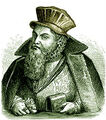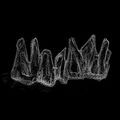Template:Selected anniversaries/November 29: Difference between revisions
No edit summary |
No edit summary |
||
| (21 intermediate revisions by the same user not shown) | |||
| Line 1: | Line 1: | ||
<gallery> | <gallery> | ||
||1484: Joachim Vadian born ... physician, scholar, and politician. | || *** DONE: Pics *** | ||
||1484: Joachim Vadian born ... physician, scholar, humanist, and politician. Pic. | |||
File:Philipp Nicodemus Frischlin.jpg|link=Philipp Nicodemus Frischlin (nonfiction)|1590: Philologist, mathematician, astronomer, and poet [[Philipp Nicodemus Frischlin (nonfiction)|Philipp Nicodemus Frischlin]] dies, killed by a fall in attempting to let himself down from the window of his cell. His prolific and versatile genius produced a great variety of works, but his reckless life and libelous letters led to imprisonment. | File:Philipp Nicodemus Frischlin.jpg|link=Philipp Nicodemus Frischlin (nonfiction)|1590: Philologist, mathematician, astronomer, and poet [[Philipp Nicodemus Frischlin (nonfiction)|Philipp Nicodemus Frischlin]] dies, killed by a fall in attempting to let himself down from the window of his cell. His prolific and versatile genius produced a great variety of works, but his reckless life and libelous letters led to imprisonment. | ||
||1627: John Ray born ... biologist and botanist. | ||1627: John Ray born ... biologist and botanist. He published important works on botany, zoology, and natural theology. His classification of plants in his Historia Plantarum, was an important step towards modern taxonomy. Ray rejected the system of dichotomous division by which species were classified according to a pre-conceived, either/or type system, and instead classified plants according to similarities and differences that emerged from observation. He was among the first to attempt a biological definition for the concept of species. Pic. | ||
File:Laurentius Paulinus Gothius.jpg|link=Laurentius Paulinus Gothus (nonfiction)|1646: Theologian, astronomer, astrologer, and Archbishop of Uppsala [[Laurentius Paulinus Gothus (nonfiction)|Laurentius Paulinus Gothus]] dies. | File:Laurentius Paulinus Gothius.jpg|link=Laurentius Paulinus Gothus (nonfiction)|1646: Theologian, astronomer, astrologer, and Archbishop of Uppsala [[Laurentius Paulinus Gothus (nonfiction)|Laurentius Paulinus Gothus]] dies. He wrote numerous theological and astronomical works, and also published calendars. | ||
||1694: Marcello Malpighi dies ... physician and biologist ... the "Father of microscopical anatomy, histology, physiology and embryology". Pic. | |||
||1694: Marcello Malpighi dies . | File:Marcello Malpighi by Carlo Cignani.jpg|link=Marcello Malpighi (nonfiction)|1694: Physician and biologist [[Marcello Malpighi (nonfiction)|Marcello Malpighi]] dies. Malpighi made pioneering contributions to anatomy, histology, physiology, embryology, and microscopy. | ||
File:Nicolaus I Bernoulli.jpg|link=Nicolaus I Bernoulli (nonfiction)|1759: Mathematician and theorist [[Nicolaus I Bernoulli (nonfiction)|Nicolaus I Bernoulli]] dies. He introduced a successful resolution to the [[St. Petersburg paradox (nonfiction)|St. Petersburg paradox]]. | File:Nicolaus I Bernoulli.jpg|link=Nicolaus I Bernoulli (nonfiction)|1759: Mathematician and theorist [[Nicolaus I Bernoulli (nonfiction)|Nicolaus I Bernoulli]] dies. He introduced a successful resolution to the [[St. Petersburg paradox (nonfiction)|St. Petersburg paradox]]. | ||
| Line 16: | Line 18: | ||
||1781: The crew of the British slave ship ''Zong'' murders 133 Africans by dumping them into the sea to claim insurance. | ||1781: The crew of the British slave ship ''Zong'' murders 133 Africans by dumping them into the sea to claim insurance. | ||
||1803: Christian Doppler born . | File:Christian Doppler.jpg|link=Christian Doppler (nonfiction)|1803: Physicist and mathematician [[Christian Doppler (nonfiction)|Christian Doppler]] born. Doppler will propose the principle (now known as the Doppler effect) that the observed frequency of a wave depends on the relative speed of the source and the observer. He will use this concept to explain the color of binary stars. | ||
||1825: Jean-Martin Charcot born ... neurologist and professor of anatomical pathology. He is best known today for his work on hypnosis and hysteria ... "the founder of modern neurology". Pic. | ||1825: Jean-Martin Charcot born ... neurologist and professor of anatomical pathology. He is best known today for his work on hypnosis and hysteria ... "the founder of modern neurology". Pic. | ||
||1847: Marcus Whitman dies ... physician and missionary. | ||1847: Marcus Whitman dies ... physician and missionary ... Following the deaths of many nearby Cayuse from an outbreak of measles, some remaining Cayuse accused Whitman of murder, suggesting that he had administered poison and was a failed shaman. In retaliation, a group of Cayuse killed the Whitmans and twelve other settlers on November 29, 1847, an event that came to be known as the Whitman Massacre. Continuing warfare between settlers and Indians reduced the Cayuse numbers further. Pic. | ||
||1847: Alfred George Greenhill born ... mathematician. He he will be one of the world's leading experts on applications of elliptic integrals in electromagnetic theory. Pic: https://fr.wikipedia.org/wiki/Alfred_George_Greenhill | ||1847: Alfred George Greenhill born ... mathematician. He he will be one of the world's leading experts on applications of elliptic integrals in electromagnetic theory. Pic: https://fr.wikipedia.org/wiki/Alfred_George_Greenhill | ||
||1859: Jérôme Franel born ... mathematician who specialized in analytic number theory. He is mainly known through a 1924 paper, in which he establishes the equivalence of the Riemann hypothesis to a statement on the size of the discrepancy in the Farey sequences. Pic. | |||
|| | ||1866: Ernest William Brown born ... mathematician and astronomer, who spent the majority of his career working in the United States and became a naturalised American citizen in 1923. His life's work was the study of the Moon's motion (lunar theory) and the compilation of extremely accurate lunar tables. He also studied the motion of the planets and calculated the orbits of Trojan asteroids. Pic. | ||
|| | ||1872: Mary Somerville dies ... astronomer, mathematician, and author. Pic. | ||
||1873: Suzan Rose Benedict born ... mathematician and academic. Pic. | ||1873: Suzan Rose Benedict born ... mathematician and academic. She had a long teaching career at Smith College. Pic. | ||
File:Thomas Edison.jpg|link=Thomas Edison (nonfiction)|1877: [[Thomas Edison (nonfiction)|Thomas Edison]] demonstrates his phonograph for the first time. | File:Thomas Edison.jpg|link=Thomas Edison (nonfiction)|1877: [[Thomas Edison (nonfiction)|Thomas Edison]] demonstrates his phonograph for the first time. | ||
||1879: Nikolay Mitrofanovich Krylov born ... mathematician known for works on interpolation, non-linear mechanics, and numerical methods for solving equations of mathematical physics. Pic. | ||1879: Nikolay Mitrofanovich Krylov born ... mathematician known for works on interpolation, non-linear mechanics, and numerical methods for solving equations of mathematical physics. Pic. | ||
||1882: Henri Fabre born ... pilot and engineer. | ||1882: Henri Fabre born ... pilot and engineer ... the inventor of the first successful seaplane, the Fabre Hydravion. Pic. | ||
||1913: Beniamin Markarian born ... astrophysicist. Markarian's Chain (of galaxies) was named after him when he discovered that this string of galaxies moves with a common motion. Pic. | |||
|| | ||1916: John Tebbutt dies ... astronomer, famous for discovering the "Great Comet of 1861". Pic. | ||
File:Madeleine L'Engle.jpg|link=Madeleine L'Engle (nonfiction)|1918: Writer [[Madeleine L'Engle (nonfiction)|Madeleine L'Engle]] born. She will write the Newbery Medal-winning ''A Wrinkle in Time'' and its sequels. | File:Madeleine L'Engle.jpg|link=Madeleine L'Engle (nonfiction)|1918: Writer [[Madeleine L'Engle (nonfiction)|Madeleine L'Engle]] born. She will write the Newbery Medal-winning ''A Wrinkle in Time'' and its sequels. | ||
||1920: Joseph Shivers born ... chemist and academic, developed spandex. Pic. | |||
File:Giacomo Puccini.jpg|link=Giacomo Puccini (nonfiction)|1924: Composer [[Giacomo Puccini (nonfiction)|Giacomo Puccini]] dies. He is remembered as "the greatest composer of Italian opera after Verdi". | File:Giacomo Puccini.jpg|link=Giacomo Puccini (nonfiction)|1924: Composer [[Giacomo Puccini (nonfiction)|Giacomo Puccini]] dies. He is remembered as "the greatest composer of Italian opera after Verdi". | ||
| Line 50: | Line 52: | ||
||1935: Ivar Otto Bendixson dies ... mathematician. Pic. | ||1935: Ivar Otto Bendixson dies ... mathematician. Pic. | ||
||1953: Ernest William Barnes dies ... mathematician and scientist who later became a liberal theologian and bishop. | ||1953: Ernest William Barnes dies ... mathematician and scientist who later became a liberal theologian and bishop. Pic. | ||
File:EBR-I powers four light bulbs.jpg|link=Experimental Breeder Reactor I (nonfiction)|1955: The [[Experimental Breeder Reactor I (nonfiction)|EBR-1]] in Arco, Idaho suffers a partial meltdown during a coolant flow test. | File:EBR-I powers four light bulbs.jpg|link=Experimental Breeder Reactor I (nonfiction)|1955: The [[Experimental Breeder Reactor I (nonfiction)|EBR-1]] in Arco, Idaho suffers a partial meltdown during a coolant flow test. | ||
| Line 57: | Line 59: | ||
||1963: U.S. President Lyndon B. Johnson establishes the Warren Commission to investigate the assassination of President John F. Kennedy. | ||1963: U.S. President Lyndon B. Johnson establishes the Warren Commission to investigate the assassination of President John F. Kennedy. | ||
File:The Man From K.E.S.S.E.L.jpg|link=The Man From K.E.S.S.E.L.|1964: Debut of '''''[[The Man From K.E.S.S.E.L.]]''''', an American science fiction buddy television series about a pair of space pilots (Robert Vaughn and David McCallum) who work for K.E.S.S.E.L., a secret interplanetary smuggling ring. | |||
||1967: Vietnam War: U.S. Secretary of Defense Robert McNamara announces his resignation. | ||1967: Vietnam War: U.S. Secretary of Defense Robert McNamara announces his resignation. | ||
| Line 62: | Line 66: | ||
||1970: The Isdal Woman (Norwegian: Isdalskvinnen) is found dead at Isdalen Valley in Bergen, Norway. Multiple investigations point to the possibility that she was a spy. Pic. | ||1970: The Isdal Woman (Norwegian: Isdalskvinnen) is found dead at Isdalen Valley in Bergen, Norway. Multiple investigations point to the possibility that she was a spy. Pic. | ||
||1992: Jean Dieudonné dies ... mathematician and academic. | ||1984: Tatyana Pavlovna Ehrenfest dies ... mathematician. Ehrenfest made contributions to De Bruijn sequences, low-discrepancy sequences, and the BEST theorem. Pic. | ||
||1988: Naval aviator, and writer Donald Keyhoe dies. In the 1950s he became well known as a UFO researcher, arguing that the U.S. government should conduct appropriate research in UFO matters, and should release all its UFO files. Jerome Clark writes that "Keyhoe was widely regarded as the leader in the field" of ufology in the 1950s and early to mid-1960s. Pic search. | |||
||1990: Malcolm Dole dies ... chemist and academic, Dole effect (isotopic oxygen). Pic (cool!). | |||
||1992: Jean Dieudonné dies ... mathematician and academic. Pic. | |||
File:Mountains.jpg|link=Mountains|2009: Signed first edition of '''''[[Mountains]]''''' stolen from the Louvre in a broad-daylight robbery by criminal mathematical functions generated by the Forbidden Ratio gang. | |||
File:Maurice Vincent Wilkes.jpg|link=Maurice Wilkes (nonfiction)|2010: Computer scientist and physicist [[Maurice Wilkes (nonfiction)|Maurice Wilkes]] dies. He pioneered several important developments in computing, including microcode, symbolic labels, macros, subroutine libraries, and timesharing. | File:Maurice Vincent Wilkes.jpg|link=Maurice Wilkes (nonfiction)|2010: Computer scientist and physicist [[Maurice Wilkes (nonfiction)|Maurice Wilkes]] dies. He pioneered several important developments in computing, including microcode, symbolic labels, macros, subroutine libraries, and timesharing. | ||
</gallery> | </gallery> | ||
Latest revision as of 16:45, 7 February 2022
1590: Philologist, mathematician, astronomer, and poet Philipp Nicodemus Frischlin dies, killed by a fall in attempting to let himself down from the window of his cell. His prolific and versatile genius produced a great variety of works, but his reckless life and libelous letters led to imprisonment.
1646: Theologian, astronomer, astrologer, and Archbishop of Uppsala Laurentius Paulinus Gothus dies. He wrote numerous theological and astronomical works, and also published calendars.
1694: Physician and biologist Marcello Malpighi dies. Malpighi made pioneering contributions to anatomy, histology, physiology, embryology, and microscopy.
1759: Mathematician and theorist Nicolaus I Bernoulli dies. He introduced a successful resolution to the St. Petersburg paradox.
1803: Physicist and mathematician Christian Doppler born. Doppler will propose the principle (now known as the Doppler effect) that the observed frequency of a wave depends on the relative speed of the source and the observer. He will use this concept to explain the color of binary stars.
1877: Thomas Edison demonstrates his phonograph for the first time.
1918: Writer Madeleine L'Engle born. She will write the Newbery Medal-winning A Wrinkle in Time and its sequels.
1924: Composer Giacomo Puccini dies. He is remembered as "the greatest composer of Italian opera after Verdi".
1955: The EBR-1 in Arco, Idaho suffers a partial meltdown during a coolant flow test.
1964: Debut of The Man From K.E.S.S.E.L., an American science fiction buddy television series about a pair of space pilots (Robert Vaughn and David McCallum) who work for K.E.S.S.E.L., a secret interplanetary smuggling ring.
2009: Signed first edition of Mountains stolen from the Louvre in a broad-daylight robbery by criminal mathematical functions generated by the Forbidden Ratio gang.
2010: Computer scientist and physicist Maurice Wilkes dies. He pioneered several important developments in computing, including microcode, symbolic labels, macros, subroutine libraries, and timesharing.











